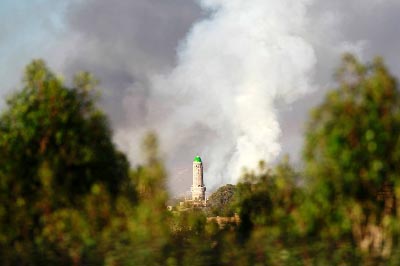
AFP, Riyadh :
The Saudi-led coalition fighting in Yemen on Monday said it had made “limited use” of British-made cluster bombs, a type of weapon which 100 countries have pledged not to use.
In its 21-month campaign against Shiite rebels who have seized much of Yemen, the Saudi-led alliance has faced repeated allegations of killing civilians.
It said it used the BL-755 cluster bombs “against legitimate military targets to defend Saudi towns and villages against continuous attacks” by the Huthi rebels.
The insurgents have killed more than 100 civilians and soldiers on the Saudi side of the border.
The coalition deployed the weapons in accordance with international humanitarian law, and not in civilian areas, it said, adding that Saudi Arabia no longer uses the BL-755.
London-based rights group Amnesty International in June alleged that “at least 16 civilians-including nine children-have been killed or injured by cluster submunitions between July 2015” and May of this year.
Amnesty said its findings came from the rebel stronghold of Saada as well as the Hajja area. Both are near the border with Saudi Arabia. One hundred nations are party to the 2008 Convention on Cluster Munitions which bans their use.
Britain is a party to the convention but Saudi Arabia, its coalition partners, and the United States are not.
British Defence Secretary Michael Fallon told parliament on Monday he welcomed the Saudi decision that it will not use further BL-755 cluster munitions.
“We will continue to keep current sales of military equipment to Saudi Arabia and other Gulf allies under review,” he said.
In January, the coalition spokesman said alliance forces had used CBU-105 cluster bombs against rebel vehicles.
President Barack Obama’s administration moved in May to block sales of cluster bombs to Saudi Arabia as concerns over civilian casualties in Yemen mounted, the journal Foreign Policy reported.
Cluster bombs contain multiple submunitions, which sometimes do not explode and become de facto landmines that can kill or maim long after being dropped.
The Saudi-led coalition fighting in Yemen on Monday said it had made “limited use” of British-made cluster bombs, a type of weapon which 100 countries have pledged not to use.
In its 21-month campaign against Shiite rebels who have seized much of Yemen, the Saudi-led alliance has faced repeated allegations of killing civilians.
It said it used the BL-755 cluster bombs “against legitimate military targets to defend Saudi towns and villages against continuous attacks” by the Huthi rebels.
The insurgents have killed more than 100 civilians and soldiers on the Saudi side of the border.
The coalition deployed the weapons in accordance with international humanitarian law, and not in civilian areas, it said, adding that Saudi Arabia no longer uses the BL-755.
London-based rights group Amnesty International in June alleged that “at least 16 civilians-including nine children-have been killed or injured by cluster submunitions between July 2015” and May of this year.
Amnesty said its findings came from the rebel stronghold of Saada as well as the Hajja area. Both are near the border with Saudi Arabia. One hundred nations are party to the 2008 Convention on Cluster Munitions which bans their use.
Britain is a party to the convention but Saudi Arabia, its coalition partners, and the United States are not.
British Defence Secretary Michael Fallon told parliament on Monday he welcomed the Saudi decision that it will not use further BL-755 cluster munitions.
“We will continue to keep current sales of military equipment to Saudi Arabia and other Gulf allies under review,” he said.
In January, the coalition spokesman said alliance forces had used CBU-105 cluster bombs against rebel vehicles.
President Barack Obama’s administration moved in May to block sales of cluster bombs to Saudi Arabia as concerns over civilian casualties in Yemen mounted, the journal Foreign Policy reported.
Cluster bombs contain multiple submunitions, which sometimes do not explode and become de facto landmines that can kill or maim long after being dropped.

